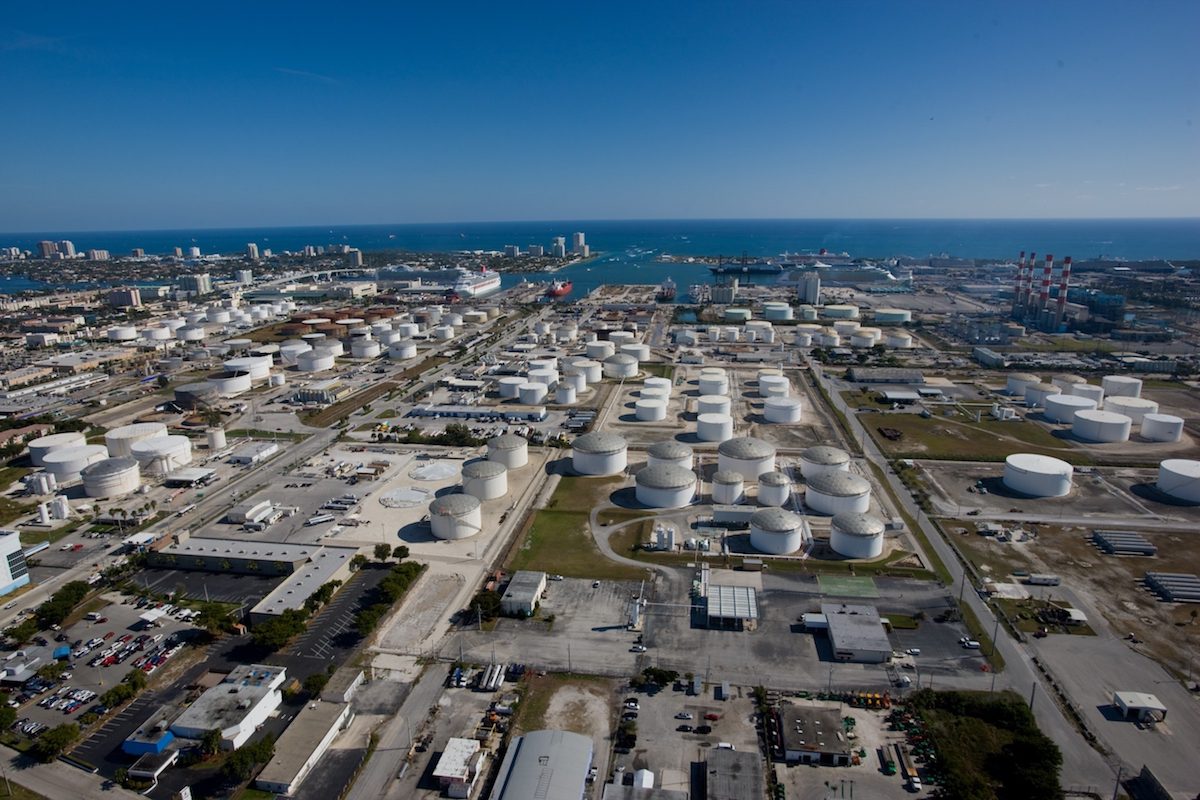India’s Oil Demand Drives CMB Tech Fleet Diversification
By Dimitri Rhodes Nov 7 (Reuters) – Belgian oil tanker company CMB Tech says it will focus on the fast growing market in India as it reported third quarter results...


Petroleum tanks see at Port Everglades, Florida. Credit: Broward County’s Port Everglades
![]()
![]()
By Devika Krishna Kumar Sept 5 (Reuters) – Fuel distributors and traders in Florida braced for a second supply shock as Hurricane Irma barreled toward the state on the heels of disruptions from Hurricane Harvey in Texas.
Irma, described by forecasters as a potentially catastrophic Category 5 hurricane is forecast to reach southern Florida on Saturday, prompting Governor Rick Scott to declare a state of emergency.
Florida does not have any refineries and its more than 20 million residents rely on refined products delivered by tanker and barge at its ports.
While locals stocked up on bottled water and plywood, fuel distributors scrambled to fill up on gasoline and diesel supplies before rough seas force port closures.
“We are also working with Homeland (Security) to get ships in before the hurricane,” said Ned Bowman, executive director at the Florida Petroleum Marketers and Convenience Store Association, which represents 98 percent of fuel sold in Florida.
Bowman added that the “window is closing fast.”
Related: Irma Is Now The Atlantic’s Most Powerful Storm EVER
The threat of Irma looms after Hurricane Harvey killed more than 60 people, dumped over 50 inches (127 cm) of rain and damaged 203,000 homes. About a quarter of U.S. refining capacity was offline as Harvey hammered Louisiana and Texas for several days, shutting key infrastructure in the heart of the U.S. oil and natural gas industry.
Retail gas prices in Florida have already jumped about 36 cents in one week to $2.68 a gallon as of Tuesday, according to motorists advocacy group AAA.
In part because of Florida’s tourism industry and heavy passenger and cargo traffic through its international airports, state demand for motor gasoline and jet fuel is among the highest in the United States, according to the EIA.
The emergency issued by the governor also lifts trucking restrictions, allowing drivers to work longer hours and more freely bring in gasoline and fuel from other states if needed.
“We talked to the governor’s staff about what the worst case scenario is,” Bowman said, adding that they were well prepared to address any fuel shortages.
Port Everglades, South Florida’s main seaport for receiving petroleum products including gasoline and jet fuel, said in a notice on its website it has gasoline reserves of at least one week stored on site.
There are a variety of cruise, cargo and petroleum ships scheduled to arrive this week and the coming weekend that could be affected by heavy weather, the port said. Currently, three petroleum ships are in port with another two waiting offshore.
Some cargoes destined for Florida could look to the New York Harbor to clear, one trader said. However, strong Florida prices mean most may simply float the cargoes until ports clear for discharge, he said.
There are 12 petroleum companies operating in and around the port that provide fuel to a dozen Florida counties and four international airports.
Southeast Petro, a wholesaler in the Southeast supplying fuel to over 400 gas stations, said it was already anticipating delays on loadings due to refinery closures in the wake of Hurricane Harvey.
“We have been placed on restricted allocations for fuel by the oil companies,” the company said in a notice on its website.
Hurricanes also often lead to demand being sapped over the short term if the storm floods areas and shuts in people.
Around Florida, southeastern states including South Carolina, Alabama and Georgia have already seen prices at the pump soar amid tighter supplies.
Colonial Pipeline Co, the biggest U.S. fuels system, reopened a portion of its main distillate and gasoline lines after being forced to a shut due to flooding at its supply points and amid dwindling supplies. However, it could take days for flows to the southeast to resume to normal rates, shippers said.
“The southeast hasn’t gotten regular supplies for a week to 10 days now due to Colonial Pipeline … and your window to get cargo in to Port Everglades is the next 48 hours or 72 hours,” one East Coast trader said.
(Reporting by Devika Krishna Kumar in New York; Editing by Lisa Shumaker)
(c) Copyright Thomson Reuters 2017.
Join the gCaptain Club for curated content, insider opinions, and vibrant community discussions.


Join the 108,948 members that receive our newsletter.
Have a news tip? Let us know.







Maritime and offshore news trusted by our 108,948 members delivered daily straight to your inbox.



Essential news coupled with the finest maritime content sourced from across the globe.
Sign Up